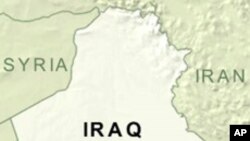The International Organization for Migration says migrants, mainly from Asia and Africa, were lured to Iraq under false pretences or unknowingly taken to work there by unscrupulous recruitment agencies.
IOM spokeswoman, Jemini Pandya, says hundreds of migrants of different nationalities now find themselves stranded in the country. She describes their situation as dire and in need of help.
"It may seem odd to think it, but despite the instability and violence and the difficult socio-economic conditions in Iraq, Iraq still is a destination country for migrants, particularly from Africa and from Asia-mainly from countries like Pakistan, Banglades, Uganda, Ethiopia, Sudan," said Pandya.
While life for Iraqis is difficult, Pandya says it is even worse for migrants back home. Therefore, she says, it is easy to see why many are lured to Iraq.
She says they are led to believe they can make easy money in sectors such as construction, carpentry and domestic labor. She says many migrants pay exorbitant fees to recruiting agents, plunging them and their families into deep debt.
"However, upon arrival many of them, their passports are confiscated, they are forced to work and sign false contracts and forced to work in very, very inhumane conditions," said Pandya. "Others have actually have come to Iraq unknowingly. They thought they were going to work in the Gulf or in the Middle East, but have ended up in Iraq and also forced to work in similarly inhumane conditions."
Pandya says there also are migrants, including many Sudanese, who have lived in Iraq for several years. She says the worsening employment conditions have left them penniless with few opportunities and no means to return home.
Over the past few years, IOM was able to assist hundreds of desperate migrants return home. But, the money for that operation now has run out. Pandya says her agency has been able to help only 32 stranded migrants return home this year.
She says IOM has helped more than 7,000 migrants of nearly 40 different nationalities in the past six years. Since funds have dried up, she says the number of stranded migrants needing assistance has increased. She adds the true scale of the problem is unknown.
News
Migrants Stranded in Iraq Need Help to Go Home
update

The International Organization for Migration is urgently appealing for $2.5 million to help up to 700 stranded migrants return home in the next two years. IOM says the migrants are destitute and living in miserable conditions.



